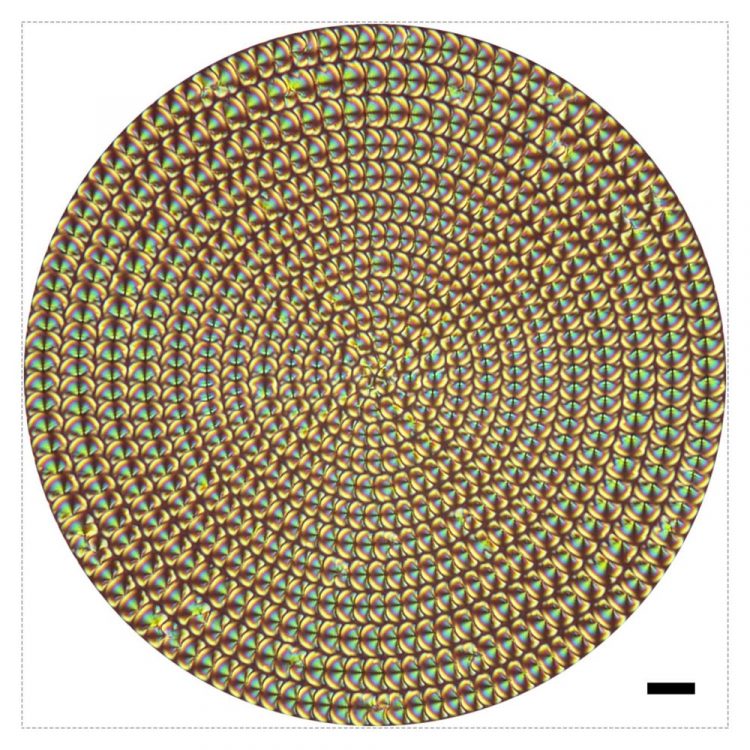4D imaging with liquid crystal microlenses

A concentric array of liquid crystal microlenses provides 4D information about objects. Scale bar, 20 μm. Credit: Adapted from ACS Nano 2019, DOI: 10.1021/acsnano.9b07104
Polarized light contains waves that undulate in a single plane, whereas unpolarized light, such as that from the sun, contains waves that move in every direction. Light can become polarized by reflecting off objects, and detecting this type of light could reveal hidden information. For example, cancer cells can reflect polarized light differently than healthy tissues. Wei Hu, Yan-Qing Lu and colleagues wanted to develop a portable, inexpensive and easy-to-use microlens to simultaneously acquire 3D space and polarization information, thereby producing 4D images.
To make their microlenses, the researchers used liquid crystals, materials found in most electronic displays. With a self-assembly process, they patterned arrays of liquid crystal microlenses into concentric circles. The researchers used a polarized optical microscope to image objects, such as a cross or the letter “E,” under different directions of linearly polarized light. Microlenses in the array imaged the object differently, depending on their distance from the object (depth) and the direction of polarized light, producing 4D information. Although the resolution needs to be improved, the technique could someday be used in applications such as medical imaging, communications, displays, information encryption and remote sensing, the researchers say.
###
The authors acknowledge funding from the National Key Research and Development Program of China, the National Natural Science Foundation of China, the Scientific Research Foundation of Graduate School of Nanjing University, the Distinguished Young Scholars Fund of Jiangsu Province and the Tang Scholar Program.
The paper's abstract will be available on November 20 at 8 a.m. Eastern time here: http://pubs.
The American Chemical Society, the world's largest scientific society, is a nonprofit organization chartered by the U.S. Congress. ACS is a global leader in providing access to chemistry-related information and research through its multiple databases, peer-reviewed journals and scientific conferences. ACS does not conduct research, but publishes and publicizes peer-reviewed scientific studies. Its main offices are in Washington, D.C., and Columbus, Ohio.
To automatically receive news releases from the American Chemical Society, contact newsroom@acs.org.
Media Contact
All latest news from the category: Physics and Astronomy
This area deals with the fundamental laws and building blocks of nature and how they interact, the properties and the behavior of matter, and research into space and time and their structures.
innovations-report provides in-depth reports and articles on subjects such as astrophysics, laser technologies, nuclear, quantum, particle and solid-state physics, nanotechnologies, planetary research and findings (Mars, Venus) and developments related to the Hubble Telescope.
Newest articles

“Nanostitches” enable lighter and tougher composite materials
In research that may lead to next-generation airplanes and spacecraft, MIT engineers used carbon nanotubes to prevent cracking in multilayered composites. To save on fuel and reduce aircraft emissions, engineers…

Trash to treasure
Researchers turn metal waste into catalyst for hydrogen. Scientists have found a way to transform metal waste into a highly efficient catalyst to make hydrogen from water, a discovery that…

Real-time detection of infectious disease viruses
… by searching for molecular fingerprinting. A research team consisting of Professor Kyoung-Duck Park and Taeyoung Moon and Huitae Joo, PhD candidates, from the Department of Physics at Pohang University…





















